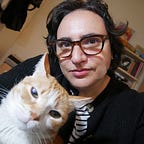My quest to document the answer to the question bothering me when it comes to the imaginary worlds I read about in books, novels and texts — Who does the dishes? — starts here. In this romantic tale of a young man, Owen, who must wed his ex-fiancé’s brother, Arthur.
Those two characters exist in a fantasy-regency world where tropes from the two genres collide — the innocent virgin, the rake and the… Mr Darcy? (tall dark and snarky? I guess). Add the alphas and the omegas of the post Twilight / Teen Wolf to the mix and we have a world where submissive tendencies are considered a blessing from the goddess, yet a good reputation is still important enough to force two strangers into the marriage bed.
Sweet and innocent Owen falls in love with the wrong man, and when solemn yet handsome Arthur, the brother of the rake, has to be the messenger of broken hearts, a new proposal is made. Angst and self doubt follow, in the best way. Owen second guesses his new fiancé’s motives and his role in a marriage to a wealthy man. Arthur must open up to his new husband if he wishes a happy life together.
So who does the dishes? Simple enough, the servants do. It’s the regency part of this world that answers the question. The protagonists are upper middle class (Owen) and rich upper class land owner (Arthur). There's a cook and a butler and a valet and all that. As befits a romantic story, dishes are not an issue.
However,
The writer serves us tea.
When Owen questions his role as a husband who might have to be in charge of the more wifely duties, it is his father who puts his mind at ease regarding those categories. And the example he gives — serving your partner a cup of tea when needed. There is nothing degrading in the act of service to your partner. A simple gesture of care and nourishment might as well be in the form of a cuppa. When Owen, heart broken by the news of his betraying fiancé and the implications to his reputation and future it is Arthur who hands him a cup. Later, it is a broken china cup that represents the distrust Owen’s parents show towards his new betrothed. And yes, that cup will return to haunt the newly weds later on in the story. But it is a romantic novel, fear not, even a cup of tea gets its happy ending.
Owen and Arthur are entering a relationship with predefined sexual roles (and as readers we will get a front seat view to that). Yet their happiness and future as a couple depends on their ability to take other roles and responsibilities in their burgeoning relationship.
So the washing of the dish is not an issue but the serving of it is — the emotional labor all couples must take active duty to perform, in the form of one delicate china cup.
